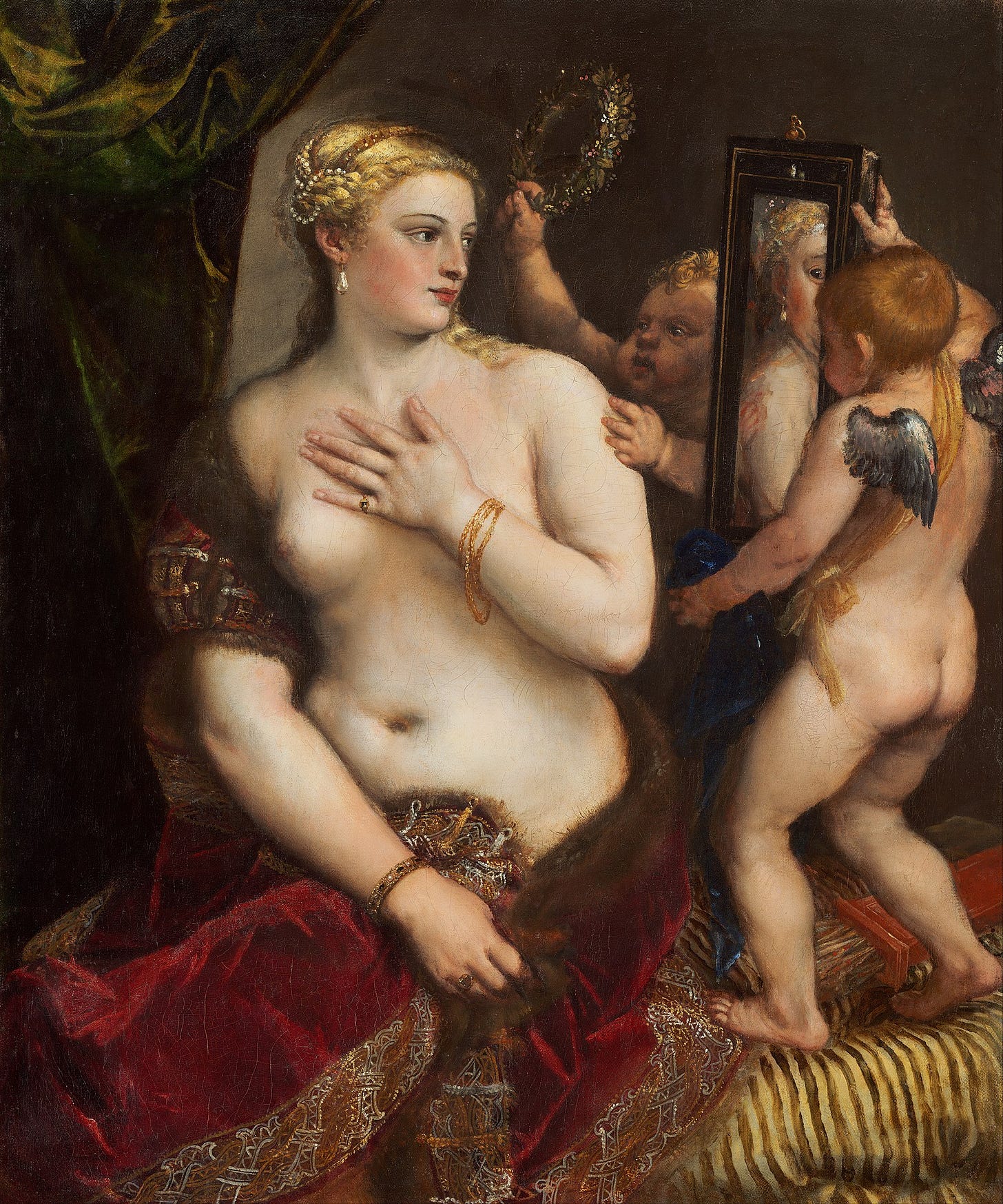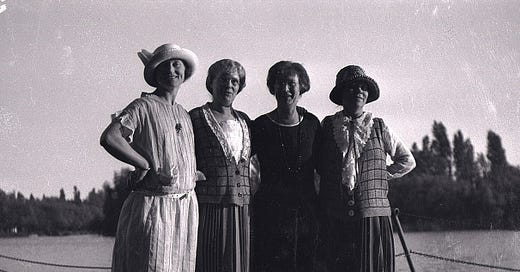Early in Leopold von Sacher-Masoch’s misappreciated 1870 novel Venus in Furs, the main character, drooling over a postcard of Titian’s Venus with a Mirror,1 exclaims: “What a woman!”

To English speakers, those words may call up vague memories of a Warner Bros. cartoon.2 In German, the connotations are more complicated.
See, in the German original, Severin does not say (as he might in present-day German) “Welch eine Frau!” or “Was für eine Frau!” Instead he says: “Welch ein Weib!”
(Ein, not eine. Weib is one of those words, like Mädchen, that is gendered in meaning and yet grammatically neuter in German. I promised I wouldn’t talk about grammar, so no more on that.)
Weib means “woman” or “wife” and seems to come from Proto-Germanic *wībą, which has the same meaning. This root is also the source of the English wife—which, in addition to its sense of “a married woman,” historically meant any grown woman. Nowadays this sense is most likely to be encountered in archaic compounds like goodwife and fishwife, though woman itself is from Old English wifmann: a “man” (in the gender-inclusive sense: a human being) who is a “wife.”3
Go back any farther, and things get murky: no one knows what Indo-European root *wībą comes from. Three possibilities have been suggested: It may refer to the female organs of generation—or, alternately, to a married woman’s veil. But the most interesting suggestion is that it derives from PIE *weyb-, which has senses relating to movement and agitation.4
Women are busy, see. They’re always moving around.
(This root is also the ultimate source of the archaic German word Weibel, meaning a [male] usher.)
Until, perhaps, the end of the nineteenth century, Weiber was a neutral term—in many times and places, I surmise, the standard term—for what in English are called “women.”

Severin’s use of it is certainly respectful: “Welch ein Weib!” is in reference to a literal goddess (she is otherwise die Göttin), and elsewhere in the book he uses it of Wanda, a woman he is contractually obligated to defer to.
But at some point, Weib crept out of favor. The standard equivalent of English woman is now Frau, which originally had a meaning closer to “lady”5 (it is cognate with the name/title of the goddess Freyja).
Wiktionary’s usage note on Weib is worth quoting in full:
Weib cannot be a neutral term for “woman” in contemporary German (for that see Frau). Nonetheless, it is still rather a current word and may be more or less pejorative depending on context. It is most often heard among men, notably in the plural, in which case it has a macho ring to it, without being particularly abusive: Du weißt ja, wie die Weiber sind... (“Well, you know how women are...”) Perhaps comparable to the use of broad in American English. Women may also use it among each other in a chummy tone: Wir Weiber müssen ja zusammenhalten. (“We girls need to stick together.”) Otherwise it is disrespectful and often combined with adjectives for stronger vilification, e.g. Dummes Weib! (“Stupid hag!”)
The German-derived languages of the Americas, Hunsrik and Pennsylvania Dutch, split from European German before this meaning change and therefore retain the nonpejorative sense of “woman” and “wife.”
And in European German, the nonpejorative sense remains in one important derivative: weiblich. This means both “female” in the biological sense and “feminine” in the grammatical and social senses,6 and is used without embarrassment despite its connection to Weib.
This post contains affiliate links to Bookshop.org. This means that, if you click on one of those links and make a purchase, I will receive a small part of the proceeds and Jeff Bezos won’t.
A picture that to me—if I can ignore the absurd Cupid with his red hair, cellulity ass, and lopsided little wings—calls to mind the words of George Eliot:
Who has not felt the beauty of a woman's arm? The unspeakable suggestions of tenderness that lie in the dimpled elbow, and all the varied gently lessening curves, down to the delicate wrist, with its tiniest, almost imperceptible nicks in the firm softness. A woman's arm touched the soul of a great sculptor two thousand years ago, so that he wrought an image of it for the Parthenon which moves us still as it clasps lovingly the timeworn marble of a headless trunk.
I have not read The Mill on the Floss, but I saw those lines in a book of extracts years ago and have never forgotten them.
I have been unable to track down any particular title, but have reason to believe the phrase was used more than once and is in the brains of other fans as well.
The English word woman has proved convenient for translators of Genesis 2:23. Here it is in the King James Version: “And Adam said, This is now bone of my bones, and flesh of my flesh: she shall be called Woman, because she was taken out of Man.”
This is, I am given to understand, a fitting translation because in Hebrew, as in English, the word for woman is formed by adding a syllable to the word for man. Luther, in his translation, had to coin the term Männin (“maness,” more or less) to get the same effect.
If this is the case, Weib is also related to an archaic English verb, of obscene significance, whose third-person present form rhymes with wives.
This means that “men and women” are now Männer und Frauen, which might look a bit asymmetrical. But the German language is subtle enough to cope with this: “ladies and gentlemen” are Damen und Herren.
The grammatical genders in German are männlich, weiblich, and sächlich: manly, womanly, and thingly. Weib, you may recall, is thingly. Don’t think about it too hard.



